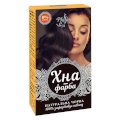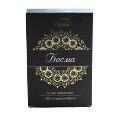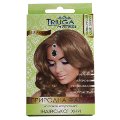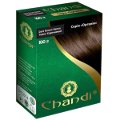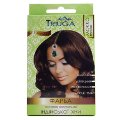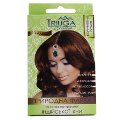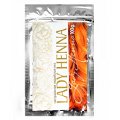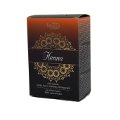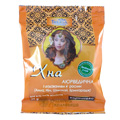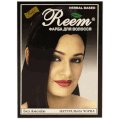 Ammonia-free hair dyes are becoming increasingly popular today; their manufacturers market them as a safer and more natural alternative to traditional hair dyes. But is that really so? What is an ammonia-free hair dye and how it is different from a regular one? Let’s figure it out together.
Ammonia-free hair dyes are becoming increasingly popular today; their manufacturers market them as a safer and more natural alternative to traditional hair dyes. But is that really so? What is an ammonia-free hair dye and how it is different from a regular one? Let’s figure it out together.
Simple logic dictates that an ammonia-free hair dye is a hair dye that contains no ammonia. But why is this so important? To understand this, you first need to understand what role ammonia plays in hair dye formulations.
Traditional permanent hair dyes are usually referred to as chemical, since they consists of synthesized substances. These substances are classified into several groups depending on the tasks they perform. For example, no hair dye is complete without an oxidiser, which “reveals” the colour of the dye and helps to secure the pigment in the hair shafts.
For the oxidiser to work, it needs a “helper” in the form of alkali. The most common alkali found in permanent hair dyes is ammonia. It creates a highly alkaline environment (pH 10–11), which is required to kick off the chemical reaction and make it easier for the oxidising agent and pigment to penetrate into the hair shafts.
If there is no ammonia in a chemical dye, the oxidation reaction will not start, and the hair cuticle will not lift to allow the pigment into the hair shaft. As a result, the dye will simply not work or, in the best case, its effect will be extremely short-lived.
But if ammonia is so important for hair colouring, why did someone come up with the idea of producing ammonia-free hair dyes? The thing is, ammonia is an extremely aggressive chemical with a very unpleasant odour. As a result, hair dyes with ammonia can cause an allergic reaction or dizziness, as well as make the hair dull, frizzy, brittle, and prone to getting tangled.
Ammonia-free hair dyes were invented to prevent this. They either use other alkalis instead of ammonia, which are more gentle on the hair, or contain no alkaline ingredients at all. Both options are considered safer compared to conventional chemical hair dyes with ammonia, but different types of ammonia-free hair dyes have their own pros and cons.
For example, hair dyes that contain another alkali instead of ammonia are typically formulated with ethanolamine. This chemical compound is generally considered safer than ammonia due to its larger molecule size. It has a more gentle effect on the hair and is less likely to cause skin irritation. The smell of ethanolamine is much less sharp than the odour of ammonia, which is important for people who can’t stand the latter.
Ethanolamine-based ammonia-free hair dyes can be as permanent as conventional ammonia-based hair dyes. In addition, they can be demi-permanent or semi-permanent. They cover grey hair well, give the hair a deep and rich colour, and have a very wide palette, which allows almost everyone to find a shade that suits them just right.
Ammonia-free hair dyes that contain no alkali at all are usually based on natural plant-based pigments, such as henna and indigo. When dyeing hair, these pigments do not penetrate into the shaft; instead, they remain on the surface of the cuticle, so they don’t completely cover the natural pigment. Because of this, dark-haired people can only use such dyes to enhance their natural hair colour.
Ammonia-free hair dyes based exclusively on henna allow to get different shades of red, depending on the original hair colour and structure, as well as the time of exposure. Mixing hair with indigo allows to get a wide range of brown and black shades. Some plants, such as hibiscus, give the final colour a burgundy hue.
100% natural ammonia-free hair dyes made from henna and other botanical ingredients allow to achieve long-lasting colour, but their result is less permanent than that of ammonia- and ethanolamine-based dyes. In addition, natural hair dyes cover only 30 to 40% of grey hair. This is why ammonia-free henna-based dyes with a small amount of chemical fixatives have become popular in recent years.
This is perhaps the best choice for those who want to reap all the benefits of natural henna and other plant-based dyes and at the same time achieve a long-lasting result and 100% grey hair coverage. Popular brands that produce such hair dyes include, for example, Aasha Herbals, Chandi, Lady Henna, Mayur, Triuga, and many more.
You can buy these and other natural hair dyes in our online shop Organic Store. We offer natural henna and indigo, as well as a wide range ammonia-free plant-based hair dyes at reasonable prices, quick order processing, secure and convenient payment methods, and international delivery to most countries.

